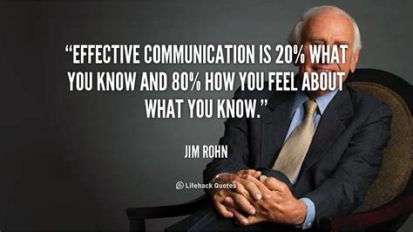The Fundamentals of Effective Communication
Our very success is heavily dependent upon our ability to communicate. This is not just for professional speakers. From schoolchildren to grandparents, everyone should work on improving their communication skills so they can improve their lives. Improving your ability to communicate will be one of the most important things you ever do.
One of the easiest ways to improve your communication is to start by solidifying your base, so to speak, by working on and improving the fundamentals. To get you started, here are a few areas that everyone should know and master.
Communication is powerful—for better and for worse. There is a proverb in the Bible that says, “The tongue has the power of life and death.” This is true. What a person says can build people up or tear them down. The ability to communicate is a powerful responsibility. Whole nations have been inspired to action because of single individual’s passionate words. On the other hand, countless millions of children have been deeply hurt because of the derogatory words spoken to them by their parents. You have within you the incredible power of communication. You can create tremendous things in your life if you take communication seriously and use its power to help others and yourself. Combining this knowledge with a heart set on doing good is the first step in unleashing this incredible force!
Communication must be purposeful. In order to be effective, your communication should be on purpose. Yes, occasionally you may say something off the top of your head and that can hold weight with others, but this is the exception and not the rule. In order to become an effective communicator, you should be very purposeful about your communication. Know what you want to communicate, when you want to communicate and how you want to communicate. Decide what kind of communication will enhance your life and the lives of those around you, and plan your steps for communicating in that way. And then work your plan—know what it is you want to accomplish and how must you communicate in order to do so.
What you say must match what you do. Remember, people watch what you do, not just what you say. What you do always outweighs what you say. If you say one thing and do another, people will follow what you do. If you say something and back it up with your actions, you will provide the “proof” for people who are listening to you, and they will much more willingly follow your lead.
Improve the “Big Two”: speaking and writing. When it comes to communication, these are the “Big Two” that everyone can improve upon: speaking and writing. For every one step that you take to increase your ability to speak and write, you will improve your career position two steps. Don’t think that you have to become the best speaker or writer in the world; just set your sights on the next level above where you are now. Once you get there, then continue to work to the next level.
Here are a few tips for becoming a better speaker and writer:
Becoming a better speaker:
– Join Toastmasters.
– Take a college course on public speaking.
– Give a speech in front of a mirror.
– Just speak—wherever you can.
Becoming a better writer:
– Keep a journal.
– Join a writing club.
– Have people who are more skilled than you help edit (and critique) your letters and e-mails.
– Take a college course on writing.
– Write that book you’ve been thinking about.
Becoming a better speaker and writer will be based on three things: doing it, getting feedback and acting on that feedback.
Learn to listen. Communication is not one direction—it goes both ways. To become an effective communicator, you must be a good listener. All of the following examples show the power of listening: the parent who listens for the feelings of his or her child; the salesperson who listens for what kind of product the client wants; the boss who listens to the concerns of his employees. Can you see how listening in those situations enables you to become a better communicator? Once you know what your “audience” wants, you will be able to better communicate to them. We covered listening skills last month in detail. I would encourage you to go back over those items until they become a natural part of you.
Care about the people with whom you communicate. Talk with them, not to them. People don’t want you to talk at them. They want to communicate. Think about it: The root word is commune, which means to live and share together. This is what we do when we communicate together—we share words and ideas. This means we must care about the people we are communicating with. We should be interested in their needs and desires. And when we know those, we can communicate more effectively with them.
Focus on clarity. The most effective communication is clear communication. Many beginning speakers believe that they should be as verbose as possible—but that is not what makes them effective! The important principle is clarity. Do they (the people in your audience) understand your message? That is the question. If they don’t, then you haven’t communicated. Be as clear and as concise as you can. Never go any longer than it takes to make the communication as clear as it needs to be. And, above all, make sure your audience understands your message when you are finished.
Communicate over and over again. In order to be effective, communication must be done over and over again. The parent or boss who yells, “How many times must I tell you?” is really just proving again that people need to hear a message many times before they internalize it. That is just the difficult nature of communication. Very rarely will you be able to communicate something just once and have someone or some group walk away with full understanding. It just doesn’t happen that way. You need to do it often and in varied ways. This is what will make your communication most effective.
Improve your vocabulary, pronunciation and spelling. When people hear you or read what you have written, they look for class and style. This can often be noticed through your vocabulary, your pronunciation and your spelling. If you want to be more effective, focus on improving in these areas. A key phrase is that our vocabulary directly affects the way we both view and interpret the world around us. If we have a small vocabulary, it limits our ability to define or communicate what we see, feel and hear. The larger the vocabulary, the better our ability to relate. What size is your view—a peephole or a huge, clear window showing the great expanse of this amazing, wonderful world we live in?
You can become an effective communicator! Start with improving the fundamentals, and you will get better. Once you have mastered the fundamentals—and very few have—then you can start on the advanced areas and become world-class!

